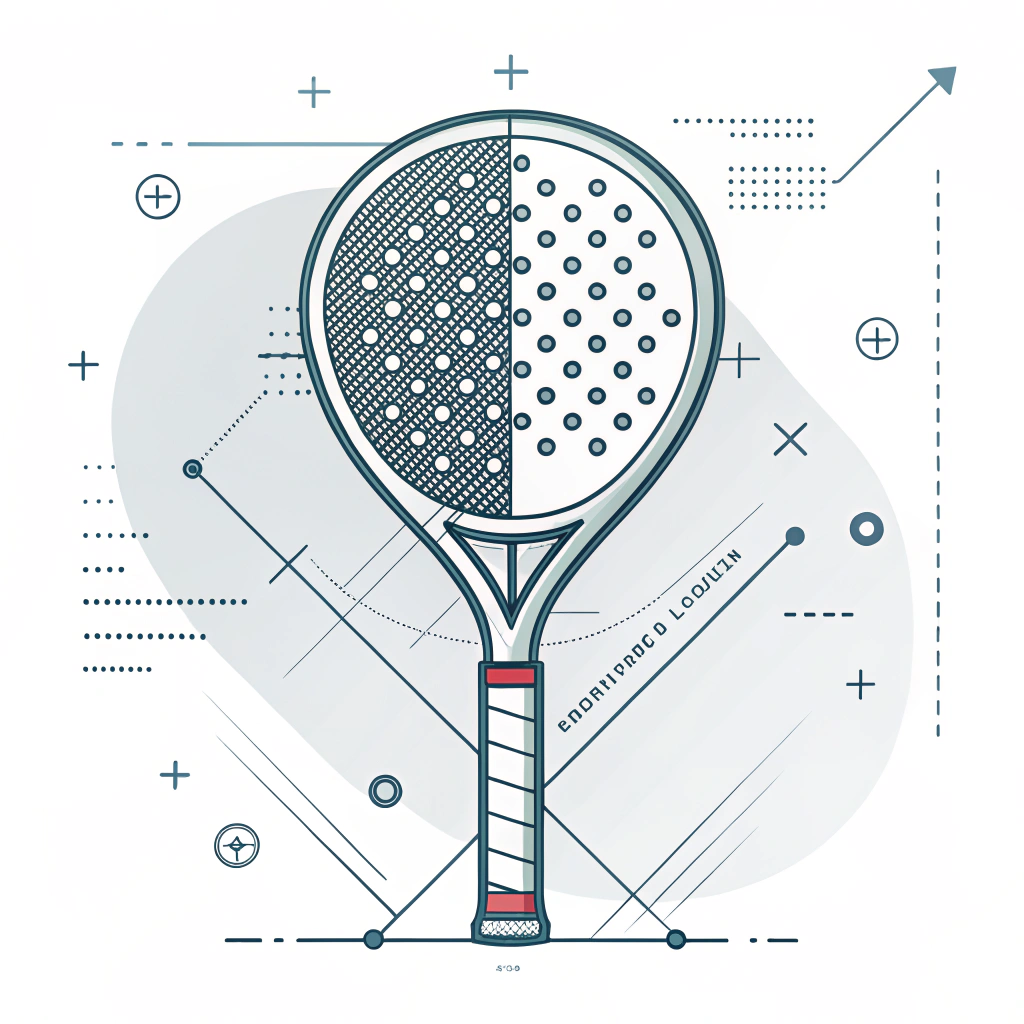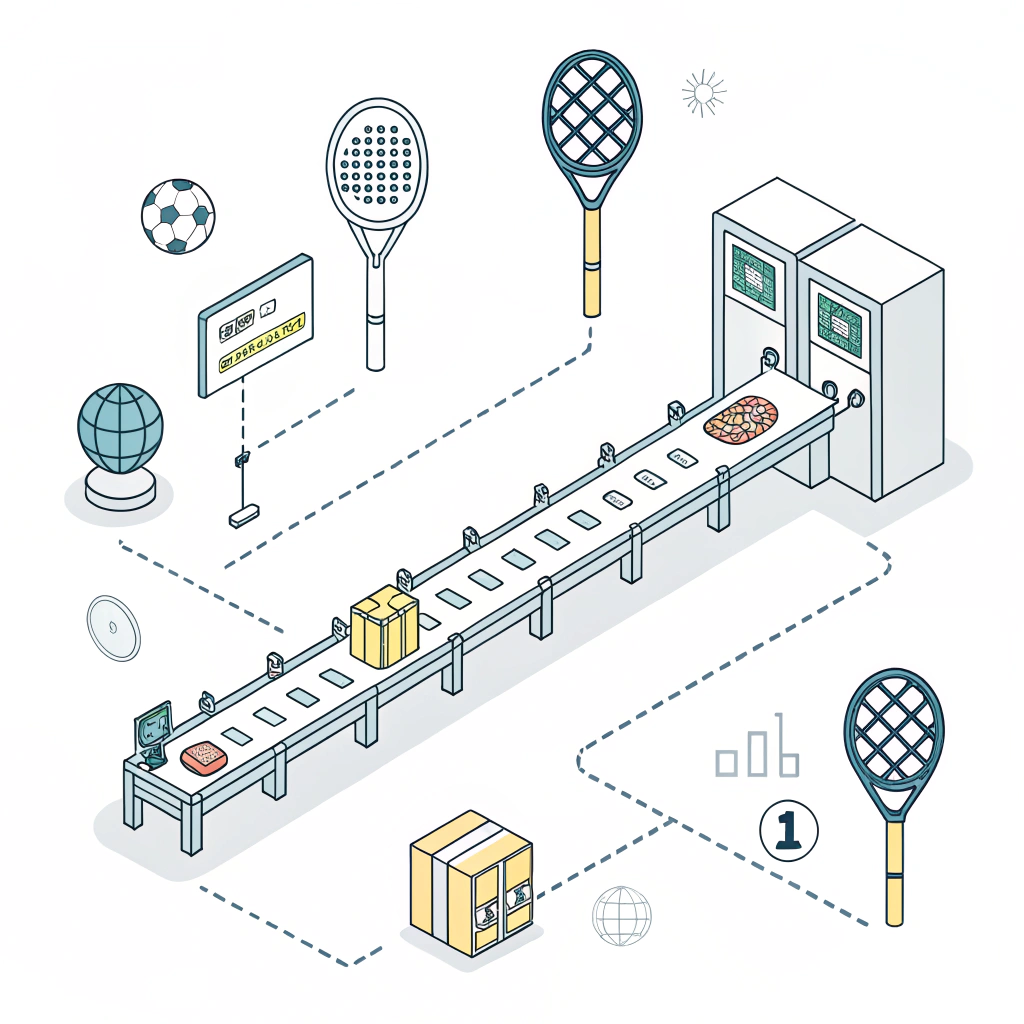In today’s fast-paced sporting goods market, selecting the right padel racket manufacturer can mean the difference between product success and missed opportunities. In this article, we quickly answer: a reliable padel racket manufacturer must combine advanced production techniques, precise material control, and extensive customization options1 to meet the specialized needs of global sporting brands.
When evaluating a production partner for your padel equipment, you face several challenges. Procurement managers and product development specialists must weigh factors including material quality2, customization capability, production speed, and adherence to industry standards. This article provides a detailed guide to help address common concerns in the sourcing process from an experienced manufacturer like NEX Padel.
A primary challenge in sourcing padel rackets is ensuring that the manufacturing process consistently meets rigorous quality standards while providing flexible customization. Many B2B buyers encounter issues such as:
• Inconsistent material quality when using composites like glass fiber and various grades of carbon fiber (3k, 12k, 18k).
• Limited customization options when tailoring racket shapes (Diamond, Round, Teardrop) to specific market demands.
• Uncertainty in production lead times and rapid prototyping3 that can hinder product launches.
• Lack of transparency in quality control processes4 and supply chain efficiency.
These issues are common pain points for procurement teams who must deliver competitive products that align with brand expectations and global standards.
The complexity of padel racket manufacturing originates from multiple interdependent processes:
- Material Variability: The transition from glass fiber composites to high-modulus carbon fibers involves strict quality checks. Inconsistent raw material quality can impair racket durability and performance.
- Customization Complexity: Each padel racket model requires unique production setups, especially when dealing with custom shapes and branding options such as logo printing on hand grips and overgrips.
- Production Efficiency: Rapid prototyping and timely delivery are crucial. A slow turnaround can delay market entry, while a rushed production schedule may compromise quality.
- Quality Control Protocols: Without transparent and stringent inspection processes at every stage—from molding to finishing—a manufacturer may not consistently meet international quality standards.
Understanding these root causes allows procurement managers to evaluate partners on their ability to overcome these hurdles.
Below is a table summarizing key criteria for evaluating a reliable padel racket manufacturer:
| Criterion | Description | Importance |
|---|---|---|
| Material Quality | Use of verified glass fiber and high-grade (3k/12k/18k) carbon fiber sources | Critical |
| Customization Options | Flexibility in designing Diamond, Round, Teardrop shapes and custom prints | Vital for Branding |
| Production Efficiency | Capability for rapid prototyping and fast turnaround in production | Competitive Edge |
| Supply Chain Transparency5 | Clear records of sourcing, manufacturing process, and delivery timelines | Trust Factor |
| After-Sales Support | Comprehensive customer service including technical advice and on-going quality assurance | Long-Term Partnership |
Each of these criteria plays a significant role in ensuring that your selected manufacturer can deliver high-performance padel rackets consistently.
At NEX Padel, advanced production methods address many common challenges:
- Advanced Material Processing:
NEX Padel ensures that every padel racket is manufactured using carefully sourced materials. For instance, the application of 3k, 12k, and 18k carbon fiber allows us to tailor the racket’s stiffness and weight, essential for different playing styles and levels. This detailed material selection not only improves durability but also enables a fine-tuned balance between power and control.
-
Customization and Prototyping:
With the rising demand for branded and unique products, the ability to fully customize racket shapes—be it Diamond, Round, or Teardrop—is a key competitive advantage. Our rapid prototyping capabilities allow you to test new designs quickly and efficiently. From the initial design stage to the final product, each customization request is handled with precision, ensuring that even bespoke requirements are met without compromising production speed. -
Quality Control and Inspection:
In an industry where performance and safety are paramount, quality control is not an option but a necessity. NEX Padel implements a series of rigorous inspections at various production stages. Automated and manual check processes are integrated to certify the uniformity and durability of every paddle. This includes stress tests and impact resistance checks that conform to international standards.
-
Efficient Production Process:
Efficient production goes beyond response times. Our manufacturing process features streamlined production lines that enhance scalability and reduce waste. From the moment an order is confirmed until the final shipping stage, every step is optimized for speed and accuracy. For procurement managers, this means reliable lead times and timely deliveries, critical factors that help meet market demand fluctuations. -
Integration with Global Supply Chains:
Given the global nature of the sporting goods market, aligning production processes with international logistics and regulatory requirements is essential. NEX Padel’s manufacturing facilities in Jiaxing, Zhejiang, China, are fully integrated with worldwide supply chain systems, allowing for real-time updates on production status and shipment tracking. This transparency builds trust and ensures that your products reach the market on schedule.
To help B2B buyers transition from evaluation to procurement, consider the following action plan:
-
Initial Evaluation:
Gather detailed production samples from potential manufacturing partners. Verify their material certifications and conduct in-house testing to ensure consistency with your quality standards. -
Customization Trials:
Request prototypes with various customization options (e.g., different racket shapes and branding elements). Assess the speed of prototyping and the flexibility in adjustments. -
Supply Chain Review:
Examine their logistics processes. Determine if the manufacturer can provide real-time production tracking and has contingency plans for unforeseen delays. -
Quality Assurance Audit:
Inspect the quality control processes. Look for documented procedures, certifications, and evidence of continuous improvement in production practices. -
Contract Negotiation:
Ensure that the contract specifies clear quality standards, customization capabilities, lead times, and support services. Use the checklist provided above as a guide to confirm that all critical aspects are covered.
| Implementation Step | Action Required | Expected Outcome |
|---|---|---|
| Evaluation | Review sample products and certifications | Confirm baseline quality |
| Customization Trial | Test prototypes with specific custom design requirements | Validate design flexibility |
| Supply Chain Verification | Audit logistics and tracking systems | Ensure on-time delivery |
| Quality Audit | Inspect quality assurance procedures and certifications | Achieve consistent high standards |
| Negotiation | Define contractual SLAs (Service Level Agreements) | Secure a reliable long-term partner |
Consider a well-known sporting goods brand that recently switched to a manufacturer offering full production transparency and flexible customization. After detailing their requirements for a new line of padel rackets, the procurement team requested several prototypes. Through rigorous testing, it was discovered that the new manufacturer not only met but exceeded performance standards in material strength and production efficiency.
Statistical data from the case showed:
• A 15% reduction in production lead time over previous partnerships.
• A 20% improvement in product durability due to better quality control measures.
• Enhanced customization options led to a 25% increase in market penetration for specialized product lines.
These numbers underscore the importance of choosing a manufacturer with robust production capabilities and commitment to continuous improvement. For B2B procurement managers, such data reinforces the decision to invest in a partner capable of handling sophisticated product requirements.
While advanced manufacturing practices are essential, it’s important to note the following considerations:
• Customization levels may significantly impact lead times. Be clear about priorities—whether speed or product uniqueness is more critical.
• Quality control variations may occur due to raw material discrepancies. Regular audits and process reviews are encouraged.
• Global supply chain complexities can sometimes affect delivery timelines. Ensure your contract includes clauses for delay management with defined resolutions.
• Technological investments in automation can increase upfront costs but often yield long-term benefits through improved product quality and consistency.
Procurement teams should weigh these factors carefully against potential market gains when drafting long-term supplier agreements.
In summary, choosing the right padel racket manufacturer requires a multidimensional evaluation of material quality, customization options, production efficiency, and quality control. NEX Padel combines advanced composite technology, flexible design capabilities, transparent supply chain integration, and rigorous quality checks to meet the demanding standards of the padel equipment market.
To move forward, B2B buyers should:
• Conduct thorough evaluations using the provided checklist as a guide.
• Schedule visits to manufacturing facilities and request in-depth production demonstrations.
• Assess the manufacturer’s capacity for both standard and custom orders.
• Negotiate terms that safeguard quality and timely delivery.
By taking these steps, you minimize risks associated with sourcing critical components while ensuring that your final product remains competitive in a dynamic and growing sports market.
People Also Ask
Where are padel rackets manufactured?
Padel rackets are typically produced in specialized manufacturing centers. For instance, many manufacturers, including NEX Padel, operate from established facilities in China with global supply chain links, while other brands may source production from Spain or Argentina depending on their legacy and design expertise.
Who makes the best padel rackets?
The best padel rackets are produced by manufacturers who combine cutting-edge material technology with extensive customization options. Brands such as Adidas, Bullpadel, Nox, Head, and Babolat are recognized for their performance, reliability, and innovative design, underpinned by stringent quality control processes.
Is siux made in Spain?
Yes, Siux padel products are developed and manufactured in Spain, where a strong tradition of racket design and craftsmanship supports their commitment to quality and innovation.
-
customization options: Discover the strategic advantages of offering tailored product configurations to meet diverse market demands and strengthen brand differentiation. ^Return ↩
-
material quality: Reading this article will help you understand the importance of sourcing high-grade raw materials and maintaining consistent quality standards to ensure superior product performance. ^Return ↩
-
rapid prototyping: Learn how rapid prototyping can accelerate the product development cycle, enabling faster market validation and reducing time-to-market risks. ^Return ↩
-
quality control processes: This section explains the systematic approaches used to monitor and enforce quality throughout production, ensuring products meet international standards. ^Return ↩
-
Supply Chain Transparency: Explore how clear visibility into your supply chain can enhance trust, improve logistical efficiency, and mitigate risks in a global market. ^Return ↩







